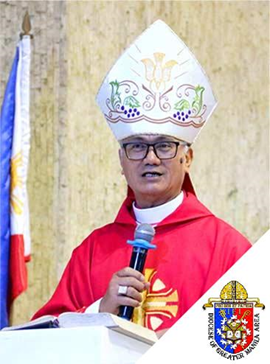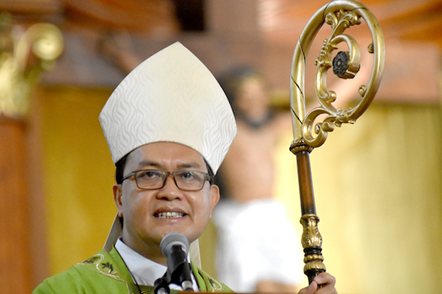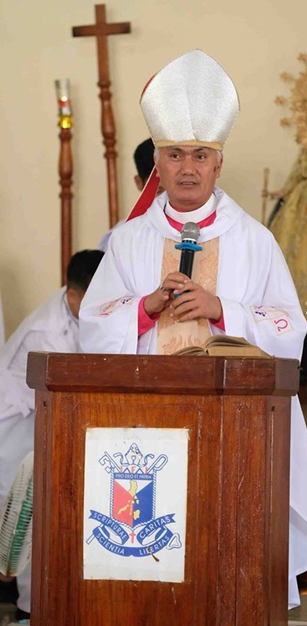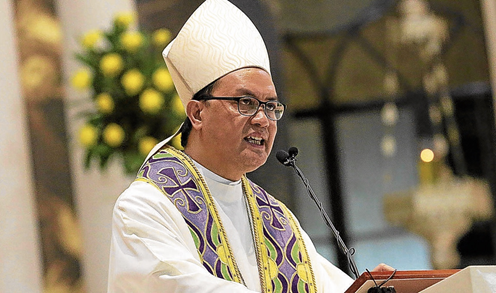LA CHIESA CATTOLICA FILIPPINA FIRMA DOCUMENTI CON LA CHIESA NAZIONALISTA PER LA RICONCILIAZIONE E IL BATTESIMO COMUNE
LA CHIESA CATTOLICA FILIPPINA FIRMA DOCUMENTI CON LA CHIESA NAZIONALISTA PER LA RICONCILIAZIONE E IL BATTESIMO COMUNE
(Il Molto Reverendo Rhee Millena Timbang, Obispo Maximo – Iglesia Filipina Independiente)
I leader della Chiesa cattolica nelle Filippine hanno firmato dei documenti con la Iglesia Filipina Independiente (IFI), o Chiesa Indipendente Filippina, „per una maggiore cooperazione ecumenica in mezzo alla diversità“.
In una dichiarazione congiunta firmata il 3 agosto, i leader di entrambe le chiese hanno detto che insieme „chiedono e pregano per il perdono reciproco per qualsiasi ferita inflitta in passato“.
„Ci impegneremo per la guarigione e la purificazione delle memorie tra i nostri membri“, si legge nella dichiarazione rilasciata in occasione della celebrazione del 500° anniversario dell’arrivo del cristianesimo nel paese.
L’IFI si staccò formalmente da Roma e si dichiarò come chiesa nazionalista nel 1902 „nel mezzo di un periodo turbolento della lotta dei filippini per l’indipendenza contro il dominio coloniale della Spagna e degli Stati Uniti“, dice la dichiarazione.
Le Filippine sono state sotto il controllo della Spagna per 300 anni fino al 1898, quando il paese ha dichiarato la sua indipendenza. Gli Stati Uniti hanno poi governato il paese fino al 1945.
„La formazione dell’IFI non era contro la Chiesa cattolica, ma piuttosto contro la continua dominazione dei vescovi e dei sacerdoti spagnoli nelle diocesi e nelle parrocchie della colonia“, si legge nella dichiarazione congiunta firmata dai leader della conferenza episcopale filippina e dai vescovi dell’IFI.
„Come parte di una rivoluzione nazionalista, la creazione dell’IFI significava anche una ‚rivoluzione religiosa‘ che faceva appello ai sentimenti patriottici del popolo che aspirava alla nascita di una nazione“, ha aggiunto.
Dal periodo coloniale americano ad oggi, il cristianesimo nelle Filippine si è evoluto con una varietà di tradizioni, hanno detto i leader della chiesa.
L’IFI ha stipulato un „Patto di partenariato“ con la Chiesa Unita di Cristo nelle Filippine ed è diventata una delle chiese-membro del Consiglio Nazionale delle Chiese nelle Filippine e del Consiglio Mondiale delle Chiese.
Ha anche stabilito concordati di piena comunione con le chiese episcopali e con diverse chiese della Comunione anglicana, le chiese vetero-cattoliche dell’Unione di Utrecht, e con la Chiesa di Svezia.
L’IFI ha anche accettato le donne nel ministero ordinato della Chiesa.
(S.E. Mons. Pablo Virgilio Siongco David, Presidente della Conferenza Episcopale Cattolica delle Filippine)
La Chiesa cattolica nel paese è cresciuta anche con la nomina di numerosi vescovi filippini insieme alla diminuzione del ruolo dei missionari stranieri. Nel corso degli anni, la Chiesa ha aperto le sue porte alla comunione ecumenica con altre chiese cristiane.
Il Secondo Consiglio Plenario delle Filippine del 1991 ha anche approvato il „vero valore dell’ecumenismo … nell’area della fede, della giustizia, della pace e dello sviluppo … per i fedeli laici, il clero e i religiosi“.
La dichiarazione congiunta di questa settimana ha anche chiesto il „mutuo riconoscimento dei battesimi“ tra l’IFI e la Chiesa cattolica. La formula battesimale trinitaria dell’IFI è già stata riconosciuta dalla Chiesa cattolica nella sua lista di battesimi validamente amministrati da altre chiese cristiane.
„Riconosciamo questo dono di Fede in Dio che è Padre, Figlio e Spirito Santo, come espresso nel Credo degli Apostoli e nel Credo Niceno“, si legge nella dichiarazione.
„Condividiamo lo stesso Battesimo, usando la formula trinitaria. Questa iniziazione sacramentale ci incorpora tutti nell’unico corpo di Cristo“, si aggiunge.
„Inoltre, entrambe le chiese manifestano una forte devozione alla Beata Vergine Maria, invocando la sua materna intercessione per tutti i suoi figli a riunirsi e per sostenere la dignità delle donne“, si legge nella dichiarazione, che è stata firmata da due vescovi episcopaliani come testimoni.
PHILIPPINE CATHOLIC CHURCH INKS DOCUMENTS WITH NATIONALIST CHURCH FOR RECONCILIATION, COMMON BAPTISM
(The Most Reverend Rhee Millena Timbang, Obispo Maximo – Iglesia Filipina Independiente)
Catholic Church leaders in the Philippines signed documents with the Iglesia Filipina Independiente (IFI), or Philippine Independent Church, „for more ecumenical cooperation amidst diversity.“
In a joint statement signed on Aug. 3, leaders of both churches said that together they „ask and pray for mutual forgiveness for any injuries inflicted in the past.“
„We shall strive for the healing and purification of memories among our members,“ read the statement released on the occasion of the 500th anniversary celebration of the arrival of Christianity in the country.
The IFI formally broke away from Rome and declared itself a nationalist church in 1902 „in the midst of a turbulent period of the Filipinos’ struggle for independence against the colonial rule of Spain and the United States,” the statement said.
The Philippines was under the control of Spain for 300 years until 1898 when the country declared its independence. The United States then ruled the country until 1945.
„The formation of the IFI was not against the Catholic Church, but rather against the continued domination of Spanish bishops and priests in the dioceses and parishes of the colony,“ read the joint statement signed by leaders of the Philippine Catholic bishops‘ conference and the IFI bishops.
„As part of a nationalist revolution, the creation of the IFI also signified a ‚religious revolution‘ that appealed to the patriotic sentiments of the populace aspiring for the birth of a nation,“ it added.
Since the American colonial period up to the present, Christianity in the Philippines has evolved with a variety of traditions, said the church leaders.
The IFI entered into a „Partnership Covenant“ with the United Church of Christ in the Philippines and became one of the member-churches of the National Council of Churches in the Philippines, and the World Council of Churches.
It has also established concordats of full communion with the Episcopal churches and with several churches in the Anglican Communion, the Old Catholic Churches of the Union of Utrecht, and with the Church of Sweden.
The IFI has also accepted women in the ordained ministry of the Church.
(H.E. Msgr. Pablo Virgilio Siongco David, President of the Catholic Bishops Conference of the Philippines)
The Catholic Church in the country has also grown with the appointment of numerous Filipino bishops together with the diminishing role of foreign missionaries. Through the years, the Church has opened its doors to ecumenical fellowship with other Christian churches.
The Second Plenary Council of the Philippines in 1991 has also endorsed the „true value of ecumenism … in the area of faith, justice, peace and development … for lay faithful, clergy and religious.”
This week’s joint statement also called for “mutual recognition of baptisms” between the IFI and the Catholic Church. The Trinitarian baptismal formula of the IFI has already been recognized by the Catholic Church in its list of validly administered baptisms by other Christian churches.
„We acknowledge this gift of Faith in God who is Father, Son and Holy Spirit, as expressed in the Apostles’ Creed and the Nicene Creed,“ read the statement.
„We share the same Baptism, using the Trinitarian formula. This sacramental initiation incorporates us all in the one Body of Christ,“ it added.
„Moreover, both churches manifest a strong devotion to the Blessed Virgin Mary, invoking her maternal intercession for all her children to come together and for upholding the dignity of women,“ read the statement, which was signed by two Episcopalian bishops as witnesses.
UDALOSTI
- HEALTH SOLIDARITY PROJECT 28 JUNE 2025 16. júna 2025
- June newsletter 11. júna 2025
- ECUMENICAL SYMPOSIUM IN OSLO ON CHALLENGES IN THE POST-CHRISTIAN ERA LODGED BY MEMBERS OF THE ORDER OF SAINT LAZARUS 8. júna 2025
- SIGNING AND FIRST IMPLEMENTATION OF THE MEMORANDUM OF UNDERSTANDING BETWEEN SAN LAZZARO ONLUS AND THE FRANCESCA MORVILLO ASSOCIATION 7. júna 2025
- REPORT ON THE SECOND PHASE OF THE RENOVATION WORKS OF THE SAN LUIGI HOSPITAL IN JERUSALEM 5. júna 2025
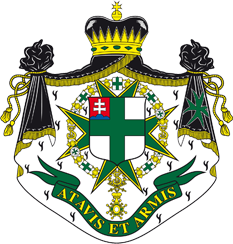
 Military and Hospitaller Order of St.Lazarus of Jerusalem Grand Priory Slovakia,
Military and Hospitaller Order of St.Lazarus of Jerusalem Grand Priory Slovakia,